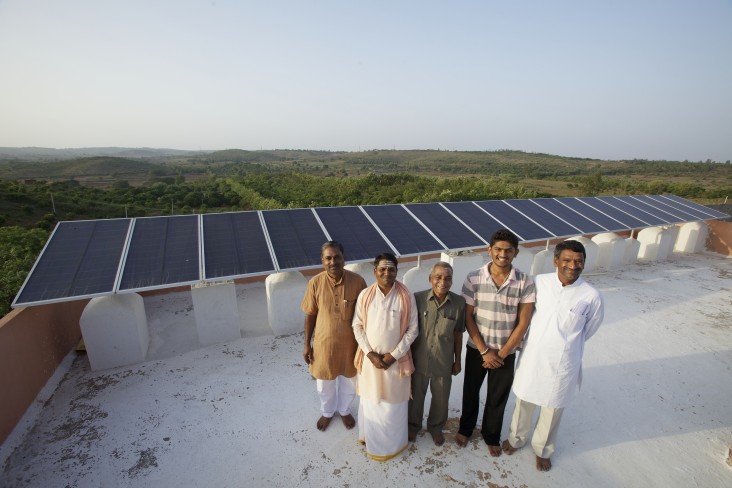
Overview
India depends heavily on fossil fuels. Energy production and consumption accounts for as much as 58 percent of India’s greenhouse gas emissions — and is projected to grow exponentially over the coming decades due to a rising energy demand associated with urbanization, better living standards, and economic modernization. As a result, clean energy is becoming an increasingly important pillar of the Government of India’s major energy security initiatives.
Over the past 15 years, the Government of India (GOI) and states have developed policies to incentivize renewable energy, attracting significant new investments. The ‘Power for All’ initiative, announced by Prime Minister Narendra Modi, aims to provide 24x7 power to all Indian households by 2020 by increasing the hydroelectric, wind and solar capacity of India’s power grid by 175 gigawatts. USAID, through its clean energy programs, is collaborating with the Government of India to help the country transition to a high-performing, low-emission, energy-secure economy.
USAID/India Programs
Partnership to Advance Clean Energy - Deployment (PACE-D): Under this flagship U.S.-India bilateral program, USAID is supporting the Ministries of Power and New and Renewable Energy to boost the growth of clean energy in India. Launched in July 2012, the PACE-D program is successfully assisting the GOI in the deployment of energy efficient technologies and decentralized renewable energy systems, such as distributed solar power, by strengthening policy and regulatory institutions, increasing access to finance, and enhancing institutional and human capacity. Our prominent efforts are focused on:
- Renewable Energy: USAID partners with policymakers, energy utilities, customers, the public and private sector, civil society organizations, and financial institutions to enable the fast and cost-effective deployment of renewable energy systems in India. These entities accomplish this by designing, developing, and implementing programs, policies, and regulations for renewable energy. In Karnataka and Madhya Pradesh, for example, the PACE-D program helped culminate the solar rooftop policy, and is assisting BESCOM, one of Karnataka’s largest electricity utilities, in installation of rooftop solar systems. To date, USAID has helped BESCOM install 14.9 MW of solar rooftop systems (across 525 commercial and residential buildings) in Karnataka. USAID also supports the GOI’s National Institute of Solar Energy to establish a “Solar Energy Training Network” to build the workforce of skilled solar energy professionals.
- Greening the Grid: USAID and India’s Ministry of Power are rolling out this major new initiative, under the PACE-D program, to build the capability of India’s power systems to manage the large-scale integration of renewable energy into its power grid at an acceptable cost. The “Greening the Grid” program focuses on: (1) rigorous analytical modeling of reforms to integrate 175 gigawatts of renewable energy by 2022; (2) supporting six grid-integration pilots to test the building blocks for improved integration of renewable energy in India’s power grid; and (3) facilitating exchanges between U.S. and Indian regulators, grid operators, and utilities to strengthen the enabling environment.
- Energy Efficiency: USAID supports India’s Ministry of Power and the Bureau of Energy Efficiency (BEE) on a range of initiatives, such as assisting the National Smart Grid Mission to implement and monitor the GOI’s smart grid pilots, and updating the 2007 Energy Conservation Building Code (ECBC) to support India’s transition to a net-zero energy building future. To this end, the PACE-D program has assisted in creating a successful knowledge portal to promote net-zero energy buildings in India. USAID is also supporting states such as Rajasthan and Haryana in implementing the updated ECBC.
- Clean Energy Finance: USAID is developing market-based mechanisms to increase the use of renewable energy and help India overcome barriers to rural energy access and decentralized renewable energy generation through microfinance. In 2015, the PACE-D program established partnerships with: (1) Tata Cleantech Capital Limited to pilot the Corporate Energy Audit Program; (2) the Indian Infrastructure Finance Company to pilot an Infrastructure Fund; (3) and the Chhattisgarh State Renewable Energy Development Agency to pilot an off-grid Corporate Social Responsibility Fund. The program also signed a Memorandums of Understanding with seven microfinance institutions to begin loan programs and develop a Solar Rooftop Project Evaluation Tool for financial institutions.
Off-Grid Energy Access: Approximately 45 percent of India’s base of the pyramid (BOP) households lack access to electricity and need to rely on kerosene for lighting. A large share of this BOP population lives in rural areas. USAID is tackling the issue of sustainable energy access by supporting off-grid or decentralized renewable energy technologies.
- Clean Energy Access Network (CLEAN): USAID, in partnership with GIZ, ICCO Cooperation, and the Shakti Sustainable Energy Foundation setup CLEAN as a coalition of 10 Indian and international non-profits to enable increased uptake of off-grid energy solutions by reducing financial and operational barriers.
- Sustainable, Clean, Access, Livelihoods, Energy (SCALE): USAID supports the SECLO Foundation’s SCALE activity to address the diverse needs of India’s poor through tailored sustainable energy service solutions. In 2015, SCALE supported 13 entrepreneurs in starting their clean energy enterprises, influenced changes to the National Solar Mission initiative to further support off-grid projects, and worked on several livelihood-related products.
- wPOWER: A joint initiative of the U.S. Department of State and USAID, the Partnership on Women’s Entrepreneurship in Clean Energy (wPOWER) trains women entrepreneurs in business skills and clean energy technologies and products (such as solar lanterns and cook stoves) that can be used in the home. These women then sell the products, increasing their incomes and introducing clean energy into their communities. Since 2012, wPOWER has trained 1,020 rural women in India, who in turn have helped one million Indians adopt clean energy products.
|
~ Achievements in 2015~
|








Comment
Make a general inquiry or suggest an improvement.